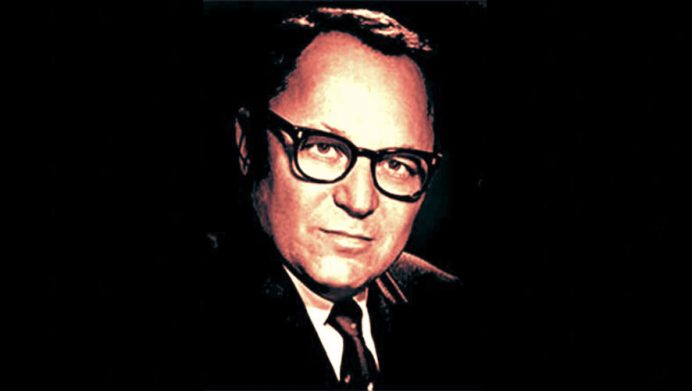Fathom is continuing its series of Rereadings, in which writers revisit classic texts, with Philosopher Bernard Harrison on Arthur Hertzberg’s The French Enlightenment and the Jews: The Origins of Modern Antisemitism, published by Columbia University Press in 1968. Hertzberg’s book argued that the French Enlightenment constituted the bridge between Classical and Christian antisemitism and the race-based antisemitism of the succeeding two centuries. Historian Hugh Trevor-Roper objected in the New York Review of Books, arguing, remarkably, that the bridge was the behaviour of the Jews themselves. Harrison, author of the forthcoming Blaming the Jews: Politics and Delusion• (Indiana 2020), offers a brilliant reflection on this controversy about the roots of modern antisemitism and explores its relevance for us today ‘concerning the enduring tendency to antisemitic delusion on the part of the more radical elements, not only of the French Enlightenment, but of more recent versions both of progressive and anti-progressive thought’.
Hertzberg’s Claim
For a time after 1945 it was commonplace to regard the Holocaust both as a blot on European civilisation and as essentially alien to it. Demonic Jew-hatred, it was widely presumed, had roots solely in Nazism and the ideas of its demented Führer; none in the broad historical ascent of European culture towards the liberal values denied and threatened by that hatred.
Hertzberg’s book was one of the first to challenge this comforting illusion. The French Enlightenment, he argues, was indeed crucial in bringing about the emancipation of European Jewry. But it also gave birth to an ‘anti-Jewish, left-wing intelligentsia’[1] whose ideas, in the hands of its heirs and inheritors, led directly to the Shoah. Worse still, Hertzberg identifies Voltaire as the chief inspiration of those ideas. ‘In his own time, Voltaire’s work encouraged anti-Semitism; it was a major obstacle to the freedom of the Jews. For the next century he provided the fundamentals of the rhetoric of secular anti-Semitism.’[2] His writings on the Jews make him ‘the major link in Western intellectual history between the anti-Semitism of classic paganism and the modern age. In his favorite pose of Cicero reborn he ruled the Jew to be outside society and to be hopelessly alien even to the future age of enlightened men.’[3]
Trevor-Roper’s Reposte
Hertzberg’s book brought him into sharp conflict with the British historian Hugh Trevor-Roper, Baron Dacre of Glanton and Regius Professor of Modern History in the University of Oxford. The latter’s lengthy review appeared in the New York Review of Books for August 22, 1968, under the provocative title ‘Some of my Best Friends are Philosophes.’ The review rejects the idea that Voltaire was in any important sense antisemitic – that is to say, prejudiced against Jews – on the ground that his opinions concerning the Jews, while offensive in tone, were simply factually correct. ‘What Voltaire says of the Jews, though unsympathetic in tone, is fair comment on matter of fact.’ Accordingly, it rejects Hertzberg’s idea that Voltaire was a pivotal influence in the passage from pre-modern to modern antisemitism. ‘To say that Voltaire’s attitude was a secularised survival of the Christian attack on the “Christ-killers” is meaningless. To say that it led naturally to “the rhetoric of secular anti-Semitism” – i.e., to racism and the mythology of the Elders of Zion – is grotesque.’
At the same time, Trevor-Roper’s review rejects the idea that classical, mediaeval and modern antisemitism are unrelated phenomena. There is a link of some kind. If that link is not the alleged antisemitism of the philosophes, and in particular of Voltaire, what can it be? Trevor-Roper’s answer is that it is to be found in the objective nature of the Jews themselves. ‘One link is the Jews. They are the constant element, far more constant than the Christians: for anti-Semitism precedes Christianity, and overflows it. We must therefore face the possibility that there is an objective basis for antisemitism in the continuing Jewish way of life. But this is a possibility which Mr. Hertzberg will not consider. To him anti-Semitism is a mere baseless prejudice nourished by erroneous ideas. Therefore its continuity must be sought not in objective Jewish fact but in subjective Gentile illusion.’[4]
Defining Antisemitism
Unsurprisingly, these remarks exposed Trevor-Roper himself to a torrent of accusations of antisemitism. In the correspondence columns of its October 24, 1968 issue, under the – if anything – even more provocative title ‘The Chosen People,’ the NYRB printed one of these – a humorous one – from the Baltimore Marxist historian Sidney Lipshires, along with Hertzberg’s measured reply to Trevor-Roper and a further reply from the latter, which to a limited extent retreats from the trenchancy of the review. There the dispute was allowed to rest.
Was Hugh Trevor-Roper ‘an antisemite’? Plenty of people who knew him well thought not. In any case, it depends what one means by ‘antisemitism.’ The term as commonly used is ambiguous in its reference. Sometimes it is taken to refer to an emotional disposition or attitude towards Jews, sometimes to a body of opinion about Jews. In the first of these senses the primary reference of the term ‘antisemitic’ is to persons; it denotes someone who feels hostility or contempt toward any individual Jew whatsoever, merely because he or she happens to be a Jew. But such dispositions of the heart are hard to establish with any certainty. As Hertzberg notes in another context ‘What was in Voltaire’s inmost heart, and why it was there, cannot be determined even by the most delicate of psychological analyses. It is an inherently insoluble question.’[5] A question, at any rate, probing inner regions accessible only to intimate friends. Answers to such questions are, indeed, customarily sought by brandishing allegedly damning remarks culled from print or social media. But any such remark may be ambiguous in ways that blunt the accusation. Does Trevor-Roper’s talk of ‘objective Jewish fact,’ for example, commit him to the claim that the ‘objective fact’ in question justifies antisemitism, or merely, and harmlessly, as he proposes in his reply to Hertzberg of October 24, to the claim that its having been taken by others to justify antisemitism explains the continuity of Jew-hatred across the centuries?
What about the second sense of ‘antisemitic’, according to which the primary reference of the term is not to persons, but rather to the content of bodies of belief or opinion? Here we are on firmer ground altogether. For a belief to be antisemitic it need only meet two conditions, in conjunction both necessary and sufficient: its content must be defamatory to Jews, and it must also be false or absurd: in Trevor-Roper’s words, a ‘subjective Gentile illusion.’
A small set of very general beliefs of this kind concerning Jews has been current since classical antiquity. They are beliefs not about individual Jews, but rather about the character of the Jewish community as a whole. They have been, and are, held uniquely of Jews, never of any other diasporic group. One is that Jews, as a people, are committed to evil on a heroic scale. A second is that, while Jews care for one another and look after one another’s interests to a degree uncommon among non-Jews (‘are very thick with one another’ is the way the antisemite would put it), they cordially hate all other nations and do their best either to damage non-Jewish interests, or to control non-Jewish wealth and agencies in the interests of diverting the powers inherent in both to the service of Jewish ends. A third is that the Jewish community not only constitutes the primary focus of loyalty for every Jew, whatever his or her (in effect, pretended) nationality in non-Jewish terms may be, but displays a degree of internal organisation in the pursuit of Jewish ends that makes it in effect a conspiracy. A fourth is that the Jewish community is a major factor in the direction of world affairs, one so significant, in fact, that the dearest dreams of the antisemite may come to nothing unless steps are taken to counter the threat to them posed by ‘the Jews.’
The detailed accusations informing these generalities change from age to age according to the political or religious concerns of the day. Thus the specific evils ascribed to the Jews have ranged over the centuries from the murder of Christ or the Blood Libel to causing wars (sometimes ‘all wars’) or ‘creating’ capitalism or communism. But through all these variations of detail, the general belief they supposedly illustrate – that the Jews are, as an organised people, committed to evil – remains stable. As I argue in a new book[6], it is surely the enduring persistence in Western culture of these essentially delusive Gentile generalities concerning Jews, rather than Trevor-Roper’s ‘objective basis … in the continuing Jewish life’, that constitutes the most evident link between classical, mediaeval, Enlightenment and modern antisemitism.
Hertzberg on Voltaire
Hertzberg has no difficulty in showing not only that Voltaire’s writings offer powerful support to all of the above generalisations, but also that they were taken as authoritative by an entire wing of French Enlightenment politics. A ‘charge that Voltaire repeated obsessively was that the Jews hate all other men.’ In his essay on the death of Calas, he adds ‘a concluding slur that God had repeatedly commanded the Jews to kill idolaters. Voltaire then left some shadow of a doubt that this was still their law. If it was, there would be no other course but to send them to the gallows.’[7]
Voltaire locates the reason for this hatred, as did Cicero, Apion and other ancient writers, in the possession by the Jews not merely of a special body of law and custom, but of one intrinsically opposed to the general increase of reason and progress in Western civilisation that Voltaire believed to have been set in motion by the Classical world, and which he saw it as the role of Enlightenment to reanimate and bring to fruition. The Jews, in his view, had contributed nothing to the march of reason. ‘Over again Voltaire insisted that the Jews borrowed everything in their culture from others, that they were certainly not the teachers of the Greeks, that they were ignorant of the arts and sciences, and that their morality was inferior to that of the Greeks and the Romans.’[8] There were indeed aspects of culture Voltaire considered specific to the Jews, but they consisted, in his opinion, mainly in a fanatical attachment to a benighted religion and an equally passionate attachment to money. ‘The only thing that properly belongs to the Jews is “their stubbornness, their new superstitions and their hallowed usury.” ‘[9] Of these, perhaps the most salient for Voltaire is the stubbornness of the Jews: their rooted resistance to principles and rules of conduct deemed compelling by all rational men. ‘They kept all their customs, which are exactly the opposite of all proper social customs; and were therefore rightly treated as a people opposed to all others.’ And as ‘the inevitable result of their laws, they either had to conquer everybody or be hated by the entire human race.’[10]
To focus exclusively on the manifest antisemitism of these poisonous generalities risks missing what it is that primarily renders them antisemitic: their distance from contact with empirical reality. Hertzberg’s careful study of the actual size, internal divisions and varying aspirations of the Jewish communities in France in the second half of the eighteenth century makes the extent of that distance evident. And that suggests a more intriguing, and possibly more answerable question, than that of whether Voltaire, or for that matter Trevor-Roper, were ‘antisemites’ in the sense of men inwardly actuated by hostility to Jews as such. Those representatives of the French Enlightenment who seconded and propagated Voltaire’s views concerning the Jews were for the most part highly intelligent men, headed by a major writer whose fame has reverberated to the present day. What could have induced people of this type on the one hand to devote vast amounts of political and intellectual energy to a tiny group of people of marginal economic and social importance to the country, leading figures among whom in any case regarded Enlightenment as offering Jews their best hope for the future, and to entertain regarding that group a collection of beliefs so utterly astray from reality? When otherwise intelligent and skeptical people commit themselves to a belief in manifest nonsense it is usually because they profit in some way from doing so. What could that profit have been in this case? Cui bono?
Projects of Total Redemption
I have in mind an answer to this question that I develop at length in the new book mentioned above. It is one that owes a good deal to David Nirenberg’s recent demonstration of how little historic antisemitism owes to contact with actual Jews and how much to fanciful conceptions of ‘the Jew’ fabricated to meet the needs of Gentile quarrels over Gentile political and religious differences.[11] Hertzberg and Trevor-Roper writing half a century ago, even if neither quite formulates it, assemble between them so much material suggestive of it, however, as virtually to have scooped both Nirenberg and myself.
Here in outline, anyway, is the answer I have in mind. Europe has known a number of vast cultural-cum-political projects each aimed at some form of redemption of society or mankind. The Enlightenment, in the minds of its supporters, was one such. Such projects require their more radically inclined supporters to believe that a total reformation of society, or mankind at large, along the lines proposed by the project is within its grasp. That belief is invariably threatened by the many fissures, social, moral and religious, that actually divide any nation, let alone the larger human world. In 1793, for instance, the revolution wrought by Hertzberg’s Men of the Enlightenment, under pressure from all sides, was to find itself facing a mass rebellion in the Vendée, which was duly put down, but only at the cost of what recent excavation of mass graves has revealed to have been effectively a genocide against the civilian population. Faced with the uneasy awareness that mass opposition cannot be ruled out a priori, believers in the – to them – self-evident moral and intellectual purity of the project must find some way of convincing themselves that such opposition is somehow either illusory, or failing that, so alien to the true spirit of the nation – or humanity – as to be easily overcome. A natural way of doing so is to persuade oneself that all serious opposition to the project is ultimately coming from some group that it is possible to regard as inherently alien interlopers, and that were it not for the machinations of that alien fraction the vast majority of ‘real’ citizens, of ‘our people,’ or (at the limit of such rhetoric) of the ‘truly human’ would be on the side of the project.
The advantage of this way of thinking, I suggest, is that, perverse and self-deceiving as it both seems and is, it nevertheless enables the more deeply committed votaries of a rising but insecurely established revolutionary project to find reassurance by misidentifying the nature and origins of the threats facing the project in ways that, paradoxically, make those threats appear more manageable, and the prospects for the eventual success of the project brighter; in addition removing the need to consider the possibility that threats to the project might stem, not from alien interference, but from defects internal to it. In the book I mentioned earlier I suggest that the perennial temptation to succumb to the seductive charms of this pattern of argument might in part explain the curious manner in which antisemitism has recurred over and over again in European culture as a sort of bolt-on component of putatively redemptive revolutionary ideologies of both left and right.
The Uses of Antisemitism
Two things, it seems to me, have predisposed political enthusiasts tempted to think in this way to find in the Jews the required ‘alien’ group. The first is the tradition originating with Tertullian and others in the second and third centuries of the Christian era, that the Jews are an inherently evil people, and that for that reason God no longer regards them as ‘chosen’, having transferred that status to the Christians.
The second is simply the failure of the Jews, over many centuries of diaspora, to assimilate totally and without remainder to any of the many matrix cultures that have hosted Jewish communities. This, of course is the ‘continuing Jewish way of life’ which Trevor-Roper regards as constituting ‘an objective basis for anti-Semitism.’ Curiously enough, on this point Hertzberg agrees with Trevor-Roper. ‘Yes he is right, and so was Voltaire before him, that anti-Semitism is generated among Western Gentiles, be they pagans, Christians or secularists, by the fact that Jews continue to exist, in all their permutations, as a recognisably different entity.’[12] It is worth noting in passing, of course, that if this is correct, occasional Jewish worries over whether Jews ‘do something’ that might account for, and possibly even justify, the enduring presence of antisemitism in Western culture are misplaced. On the Hertzberg/Trevor-Roper account there is indeed ‘something that Jews do’ that accounts for antisemitism; unfortunately that ‘something’ turns out to be merely continuing to exist as Jews.
Jews as they exist, of course, are never numerous nor powerful enough to be plausibly cast as the main organisers of mass Gentile hostility to Gentile mass movements as vast in their impact as the Enlightenment. But that objection can easily be got over, then as now, by inflating the occasionally chaotic but generally close and fraternal character of Jewish life into the myth of a mysterious Jewish Conspiracy vested with demonic power sufficient to raise reactionary armies from nowhere or to bring such feeble Gentile constructions as World Finance or the White House helplessly under its control.
Recent cases of antisemitism functioning as an aid to the reassuring misidentification of threat are not hard to find. T.S Eliot, for instance, in After Strange Gods (1934), assessing the prospects for a society based upon Christian and Catholic Orthodoxy of the kind Eliot had long embraced, notoriously observes at one point: ‘What is still more important is unity of religious backgrounds; and reasons of race and religion combine to make any large number of free-thinking Jews undesirable.[13] Much ink has been spilled over the question whether that remark shows Eliot to have been an antisemite in the first of the two senses canvassed above, namely someone hostile to Jews qua Jews. A more interesting question, to my mind, one which runs parallel to the ones I have been raising here, is, surely: What could have induced a man of Eliot’s intelligence to imagine that ‘free-thinking Jews’ – never a very ‘large number’ in Britain at the best of times – might constitute a major threat to ‘unity of religious backgrounds’, when in reality all pretence of any such unity had by 1934 long since vanished under the joint pressures exerted, on the one hand by religious schism, and on the other by the presence of genuinely large numbers of free-thinking gentiles? Unless the function of the reference to ‘large numbers of free-thinking Jews’ is to suggest, absurdly, that most free-thinkers are Jews, it is difficult to see what its function in the context of the passage could be.
It would hardly be unreasonable, either, to find in the antisemitism of the Nazis a similar logic, of seeking reassurance by misidentification of threat. Hitler appears genuinely to have believed that the (in actual fact minuscule) political influence of the European Jewish community posed a threat to Germany and the Third Reich so central and extreme that exterminating the entire community was necessary, and possibly sufficient, to ensure the enduring success of Nazism. In the event, of course, quite other threats proved to be the ones that should have worried him.
Antisemitism and the French Enlightenment
Hertzberg provides overwhelming evidence for the presence on the left of the French Enlightenment of the same tendency to inflate the significance of an essentially imaginary Jewish threat as a means of deflecting attention, reassuringly, from the possible impact of real ones. It was essential to that process that the Jews should be seen, on the one hand as posing a substantial threat to the future of Enlightenment in France, and on the other as irremediably alien: as intrinsically incapable of becoming Frenchmen. The left-wing pamphleteer De Laissac pursues both of these claims in a public letter to one of the proponents of the motion of 28 January 1790 that gave equality to certain categories of Jews. ‘De Laissac’s basic thesis was that the Revolution represented an attempt to create, by man’s own effort, the best human community in all of history. France dared not risk this great hope by adding to its polity “the vilest people in the world.” The Jews would poison the new spirit; they were and would remain strangers, and the presence of strangers within a nation would hurt the body politic. Treason and espionage flourished most readily among aliens. A nation was in danger of falling apart when its population became mixed, as Rome moved towards decline after it admitted Jews and all kinds of Orientals.’[14]
Hertzberg makes the point, redolent of Nirenberg’s recent arguments in Anti-Judaism, that, not only for people like De Laissac, but for such major figures on the left of the movement as Voltaire, Diderot and D’Holbach, what underpinned the presumption of an insuperable, because intrinsic Jewish resistance to Enlightenment was not fact, but rather the central role played by that presumption to a system of thought.
‘Overwhelming evidence shows that both Jews and gentiles, whether “enlightened” or not … understood [Voltaire] to mean more than that the Jew was the most difficult to enlighten and regenerate. He, Diderot and D’Holbach were understood to be teaching that the Jew was … irretrievably alien.’[15] But this was contrary to the facts of Jewish life, not only in the largely assimilated Sephardi communities of Bordeaux and Avignon, but also among the somewhat larger Ashkenazi community of Metz and its environs, which Voltaire, living where he did at Ferney, was in a position to know well. ‘In the 1760s and 1770s Jews in France were fighting for the right to abandon usury and enter the guilds. They were attempting to take the first step in becoming new men, of precisely the kind that Voltaire wanted.’[my italics][16]
Why should a leader of the Enlightenment choose to ignore evidence that even Jews were coming over to his side of the argument? It is hard to think of any reason other than a wish to preserve the fiction that irreconcilable rejection of the values of Enlightenment was a response only to be anticipated from a corrupt and alien ‘oriental’ minority, and hence one that it would be reasonable to regard as intrinsically foreign to the native French.
Hertzberg again: ‘the mainstream of the thinking of the Enlightenment, led by Voltaire, was absolutist. It imagined itself as a positive force for the making of a new world, and everyone [my italics] had to be remade in order to be part of the new heaven.’[17] Evidently, it would be easier to believe in the possibility of remaking the entirety of the French people in the image of the new outlook if one could regard the French people as somehow intrinsically predisposed to Enlightenment, and in that respect intrinsically superior. The argument explicitly takes this shape, Hertzberg shows, in the hands of Diderot. Diderot regarded Christianity as superior to Judaism, but both as ‘irretrievably damaged by [sharing] the fundamentally Jewish character of credulity, superstition, and fanaticism … The over-all difference between Christians and Jews was that Christianity was a religious over-lay in Europe for people whose essential character was not Oriental, and who thus could be returned to their true nature if they were freed of religion. The task was much harder, if not impossible, for the Jew, because his religion and his character were one.’[18]
What this argument comes down to is that the French are intrinsically apt for Enlightenment because, as Europeans, they are heirs to the values of the Graeco-Roman world whose moral ethos Voltaire and Diderot see it as the task of Enlightenment to revive. The ‘Oriental’ character of the Jews, on the other hand both excludes them from that heritage and ensures irreconcilable hostility to it, thus rendering their presence permanently dangerous to it. In the thought of these Enlightened intellectuals, in other words, the function – the payoff – of the convenient myth of the intrinsically irredeemable Jew is the part it plays in sustaining the other, and this time indispensable myth of the universally – because also intrinsically – redeemable Gentile.
It is unclear in Diderot whether the supposed inability of Jews to rise to the demands of Enlightenment is to be seen as a cultural deficiency – a consequence of what Diderot takes to be the inseparable unity of religion and national character in the case of the Jew – or a racial one. But clearly there is little in Diderot’s argument to stop one reading it in the second way. It is this, among other things, that leads Hertzberg to see the French Enlightenment – pace Trevor-Roper – as constituting the bridge between Classical and Christian antisemitism and the race-based antisemitism of the succeeding two centuries. It is hard not to grant that he has a point.
Conclusion: Why the Jews are still being cast as getting in the way of universal redemption
Hertzberg’s argument also suggests, as we have already noted, reasons why we should expect antisemitism to recur as a disease of the radical, or fundamentalist versions of political or religious movements, including ones consciously ‘anti-racist’ in their own estimation. Hertzberg makes the point that Montesquieu was less hostile to Jewish demands for emancipation than Voltaire because he represented ‘a tradition of enlightened thinking that ran counter to all this intellectual absolutism in the name of an appreciation of the Jew and Judaism as one of the many valid forms of culture and religion.’ Trevor-Roper, in his review, fully grants this difference between the two. ‘Now that there is a profound difference between the philosophy of Montesquieu and the philosophy of Voltaire no one would deny; and it is equally undeniable that Montesquieu was the more liberal of the two. Montesquieu was a relativist: he believed that societies were formed by a plurality of forces, and that they differed from one another, and differed legitimately, in accordance with the differences of those forces. His attitude to minorities was logically the result of his general philosophy . . . On the other hand Voltaire, a far less subtle or consistent thinker, believed in the linear progress of mankind toward a unitary truth of ‘philosophy’, and tended to judge men by their willingness to move in that direction. He had little of Montesquieu’s respect for the non-intellectual pressures of tradition, custom, or social force. It was for this reason that Gibbon, a disciple of Montesquieu, ended by repudiating Voltaire as in some respects ‘a bigot, an intolerant bigot.’[19]
The fundamentalist wing, not only of the Enlightenment but of any radically reforming movement, political or religious, left or right, tends to be defined by its determination both to simplify the goals of the movement and to treat them as ‘unitary truths of ‘philosophy’‘ to which, if the movement is to succeed, everyone without exception must be brought to accord an equally unitary and comprehensive submission. It is the fundamentalist wing of any such movement, therefore, that has the most to fear from the obstinate facts of human diversity, not only in the shape of what Trevor-Roper terms ‘the non-intellectual pressures of tradition, custom, or social force,’ but in that of competing intellectual systems. Hence it is that wing of any such movement that will always stand in most need of a story that will somehow make it plausible to regard all such pressures and constructs as the work of alien forces endlessly striving to corrupt a social order otherwise ready and waiting to respond positively and without serious dissent to the proffered opportunity of universal redemption. That, it seems to me, is ultimately what Hertzberg’s book has to teach us concerning the enduring tendency to antisemitic delusion on the part of the more radical elements, not only of the French Enlightenment, but of more recent versions both of progressive and anti-progressive thought.
• Blaming The Jews: Politics and Delusion offers a systematic analysis of the ancient delusion that ‘the Jews’ collectively dominate world affairs and that a ‘Jewish Threat’ lies at the root of all the world’s evils. The book occupies itself, among other things, with the renewed role of such ideas in anti-Zionist and BDS thinking about Israel, with the question of who profits from propagating such delusions, and with the related question of why the Jews, of all people, should have found themselves targeted by them. It concludes by enquiring at length whether antisemitism masquerading as a pseudo-explanatory theory of world affairs, however much it may serve the interests of certain non-Jewish political movements to propagate it, has not exacted a price from the wider non-Jewish world almost as great as the appalling price it has exacted from the Jews.
References
[1] Hertzberg, p.367.
[2] Hertzberg, p.286.
[3] Hertzberg, p.10.
[4] Hugh Trevor-Roper, ‘Some of My Best Friends Are Philosophes,’, New York Review of Books, August 22, 1968
[5] Hertzberg, p,286.
[6] Bernard Harrison, Blaming the Jews: Politics and Delusion, Indiana University Press, forthcoming autumn 2020.
[7] Hertzberg, 304.
[8] Hertzberg, 303.
[9] Voltaire, Philosophical Dictionary, cited by Hertzberg, 302.
[10] Voltaire, Essai sur les moeurs, cited by Hertzberg, 302.
[11] David Nirenberg, Anti-Judaism: The History of a Way of Thinking. NY: W.W. Norton (2013).
[12] Hertzberg, Reply to Trevor-Roper, New York Review of Books, October 24, 1968.
[13] T. S. Eliot, After Strange Gods (1934), 19-20.
[14] Hertzberg, 353.
[15] Hertzberg, 286.
[16] Hertzberg 286.
[17] Hertzberg, 312.
[18] Hertzberg, 312.
[19] Hugh Trevor-Roper, ‘Some of My Best Friends Are Philosophes,’ New York Review of Books, August 22, 1968.






































Excellent piece. All attempts to imagine perfecting man, perfecting society, characterising the nation the spirit of the people, or the culture will tend to exclude Jews as an imagined “other”. By definition they cannot be as the host nation, society, culture is. They are imagined because as all books about Jews by non-Jews show extraordinary ignorance of Jews, their diversity and their varied “cultures” as well as their core individual and communal moral philosophy. Real Jews rarely come into the argument. I have never read a book by a non Jew which shows even a modest understanding of Jewish thought and how they are amongst the very few survivors of ancient tribes. How have they survived if they got so much wrong? I suggest it is the link between personal and communal morality.
Prof. Harrison:
I would like to ask about the following sentence, which seems confusing:
“Hertzberg makes the point, redolent of Nirenberg’s recent arguments in Anti-Judaism, that, not only for people like De Laissac, but for such major figures on the left of the movement as Voltaire, Diderot and D’Holbach, what underpinned the presumption of an insuperable, because intrinsic Jewish resistance to Enlightenment was not fact, but rather the central role played by that presumption to a system of thought.”
The word “insuperable” is an adjective, but there is no obvious noun that it modifies. At least to me, it is not obvious what you are trying to say in this sentence.